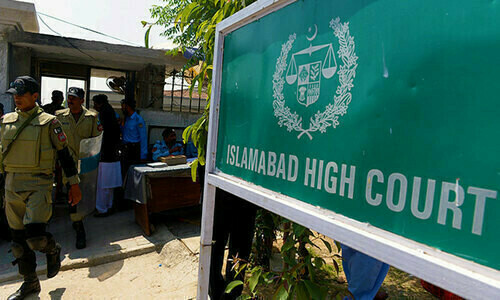WASHINGTON, March 24: Senior US officials have acknowledged that the sanctions imposed on Pakistan in the 1990s prevented successive US administration from taking any action against the Taliban and Al Qaeda.
Officials as senior as former and serving secretaries of state and defence - who were testifying before the 9-11 panel on Tuesday and Wednesday - acknowledged that the sanctions proved counter-productive.
They said the sanctions were imposed as a punishment for Pakistan's nuclear programme and for the October 1999 military coup. They failed to achieve both the targets, the officials said.
They argued that the path to Al Qaeda chief Osama bin Laden ran through the Taliban who were friendly with Pakistan but the sanctions deprived Washington of the leverage needed to influence Islamabad.
"An unbelievable number of sanctions left presidents Bill Clinton and George Bush without the much-needed leverage," said Deputy Secretary of State Richard Armitage.
The panel was told that the US pressed two successive Pakistani governments to demand that the Taliban cease providing a sanctuary for Osama bin Laden and Al Qaeda. The US administration also proposed that Pakistan cut off its support for the Taliban if the militia refuses to stop supporting Al Qaeda.
But before the Sept 11, 2001 attacks, the US could not persuade Pakistan to reconsider its relationship with the Taliban, US officials said. In July 1999, US officials said, former ISI chief Lt-Gen Hamid Gul assured the Taliban leaders that he would provide three to four hours of warning before any US missile launch as he had 'the last time.'
This, the officials said, was a reference to the August 1998 missile strike against suspected Al Qaeda targets in Afghanistan. They said Gen Gul had used his influence in the ISI to warn the Taliban before the attack.
Secretary of State Colin Powell told the panel that even before the 9-11 attacks, the Bush administration had concluded that "Pakistan was critical to the success of our long-term strategy."
"To get at Al Qaeda, we had to end Pakistan's support for the Taliban. So we had to recast our relations with that country. But nuclear sanctions, caused by Pakistan's nuclear tests and the nature of the new regime, the way President Musharraf took office, made it difficult for us to work with Pakistan," he said.
But the Bush administration, he said, did not want to mend its relations with Pakistan at the cost of its ties to India. "We knew, however, that achieving sustainable new relations with Pakistan meant moving more aggressively to strengthen and shape our relations with India as well.
So we began this rather more complex diplomatic approach very quickly upon assuming office," said Mr Powell. Mr Powell said the Bush administration had realized that a serious effort to remove Al Qaeda's safe haven in Afghanistan might well require introducing military forces, especially ground forces.
"This, without the cooperation of Pakistan, would be out of the question. Pakistan had vital interests in Afghanistan and was deeply suspicious of India's intentions," he added.
"From early 2001 onward, we pressed the Taliban directly and sought the assistance of the government of Pakistan and other neighbouring states to put additional pressure on the Taliban to expel Osama bin Laden from Afghanistan and to shut down Al Qaeda. On Feb 8, 2001, we closed the Taliban office in New York."
Mr Powell said in June, July and August, the Bush administration "took every effort that was available to us to put pressure on Pakistan to cut its losses with the Taliban" and to make sure that "Pakistan understood the need to bring Afghanistan around to eliminating the threat provided by Al Qaeda and its presence in Afghanistan."











































Dear visitor, the comments section is undergoing an overhaul and will return soon.